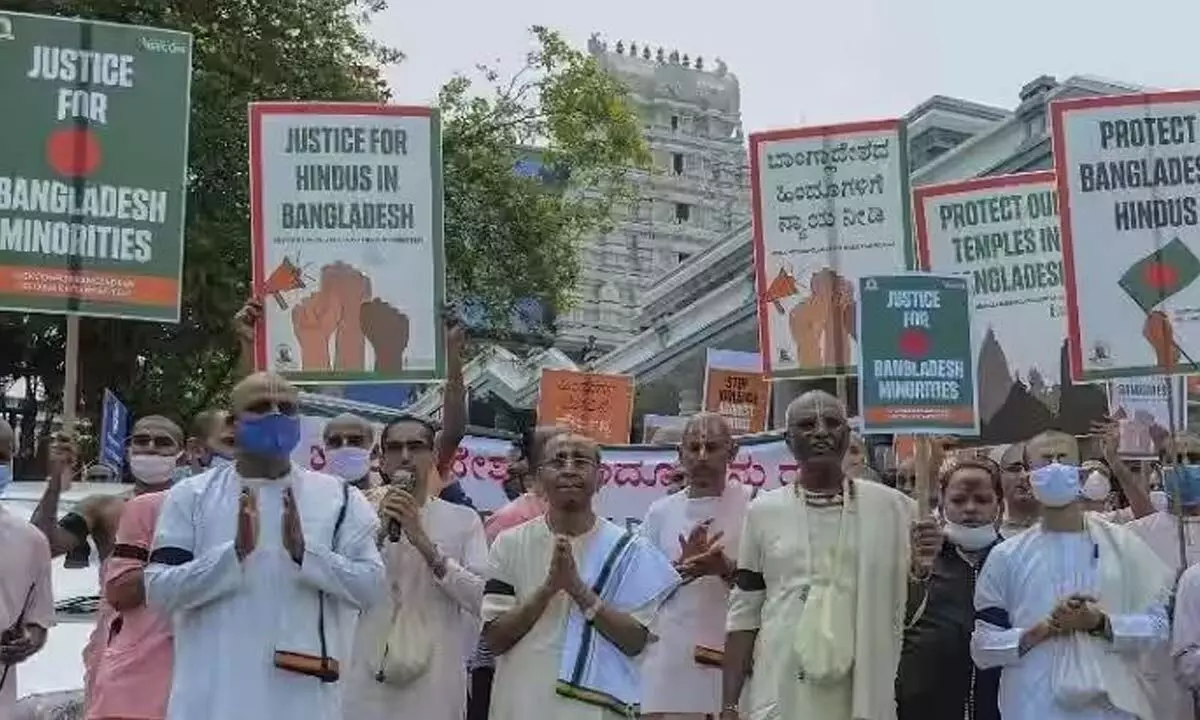Live
- Sikkim govt to constitute state Niti Ayog: CM Tamang
- CBI books Rajasthan narcotics inspector for Rs 3 lakh bribe
- Rajasthan bypolls: A tough contest between BJP and Congress
- Albania joins SEPA, paving way for EU integration
- Japanese government approves 250-billion USD economic package to ease price pain
- Six pharma companies to set up their units in Telangana
- The Unstable Events of a 17-Wicket Day in Perth: India vs Australia
- Dutch FM's Israel trip cancelled after Netanyahu's arrest warrant
- UK to increase energy price cap by 1.2 per cent
- Ethiopia launches national coffee platform to maximise earnings
Just In
Bangla riots: Brace for an influx of refugees


The turn of events is akin to surge of anti-India feelings in 70s
It was December 1971. We, as students, were all glued to the radio hearing the news of fall of Sylhet, Khulna, Comilla to Indian Army one by one. Local papers were full of reports of how submarine Ghazi was sunk off the coast of Vizag in Bay of Bengal. And then the release of Mujibur Rahman from prison in Pakistan and his address at Delhi on his way to Dhaka and finally taking over as Prime Minister of Bangladesh. In a war that lasted 14 days, India defeated Pakistan and a new nation Bangladesh was born.
The honeymoon did not last long, however. Sheikh Mujibur Rahmanfailed to provide a good and efficient government. Corruption was rampant. And, finally, he and his family members were assassinated in 1975.
After a military rule and subsequent elections, which were never held in a free and fair manner, different leaders, military and political, ruled the country and, finally, Sheikh Hasina had the longest tenure for the last decade and a half and now left the country in a state of anarchy.
To think that Bangladesh was a secular country from the beginning and that the religious extremists took over now may not be a correct reading of the situation in Bangladesh.
The bond of language and anti-western Pakistan feeling united the nation beyond religion but the moment it became a separate country, anti-Indian feelings and religious extremism, both, started showing their ugly heads in early stages. Khushwant Singh, who was then the editor of Illustrated Weekly, visited Bangladesh immediately on its formation and commented on both these trends in the newly formed nation.
It is not surprising once Sheikh Hasina was thrown out, both these trends are showing up in the Bangladesh community. There is a strong anti-India sentiment and the targeting of the Hindu community in Bangladesh today.
There is a feeling in India that with the exit of Sheikh Hasina, India has lost an advantage. This may not be really true. In fact, as a bigger neighbour, Bangladesh always needs India more than India needs Bangladesh. If we develop a business-like dealing with Bangladesh, we can work to our advantage whoever is in charge of running that government. True, China and America may try to gain significant strategic advantage with the new players running the country. But the fact that the interests of China and America are adversarial gives us elbow room to maneuver. If they shelter extremists from northeastern states, we can also play the same game against them.
But the real problem is going to be the influence of the religious extremist party Jamait in the new government. If they continue specifically targeting the Hindu population as they are doing now, we will have problems of immigrants across the border. We may need a more comprehensive CAA (Citizenship Amendment Act) to accommodate them. Even earlier, it was never a safe place for Hindus and will be much worse in days to come. In fact in 1972, when Kushwanth Singh visited a Hindu refugee camp in Kolkata after his visit to Bangladesh, this is what the Hindu refugees told him then itself. "I repeat that the Pakistanis and the razahars are in jail. They were not Pakistanis or razahars or Biharis who killed and looted in our villages, they were Bengali Moslems,” says Ranjana Kitania. The men agree with her. “Who will protect us from the Moslems? Will your army remain in Bangladesh?”
Given that the situation was so even in 1972, to expect it to be any better now is like living in a fool’s paradise. Sooner than later, Bangladeshi Hindus may not have much of a choice than to move over to India. This may be one of the biggest problems India may have to face in near future and we have to be prepared to handle it.
Another comment by a west Pakistani military person who was at that time in Bangladesh as POW to Khushwant Singh, when he visited Bangladesh just after its liberation, is very interesting. "They are a race of namakharamas” replies Nawaz. “They'll betray you as they betrayed us.”
May be, he is being proven right, looking at the turn of events in that country.

© 2024 Hyderabad Media House Limited/The Hans India. All rights reserved. Powered by hocalwire.com






